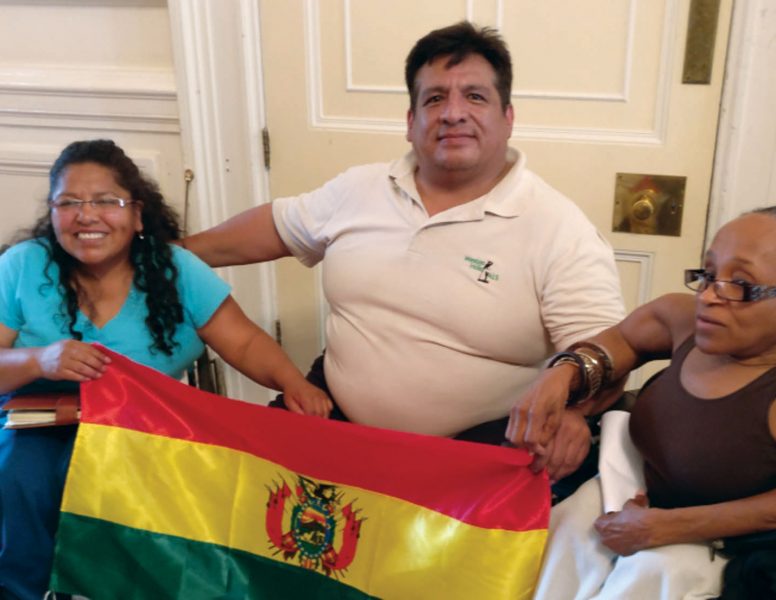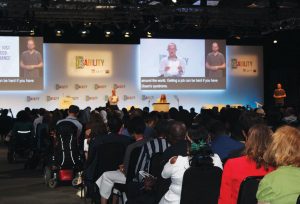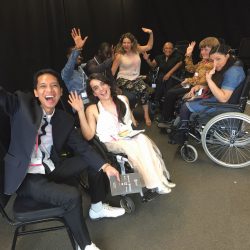Global Disability Summit
Michelle Daley and Richard Rieser report on the first Global Disability Summit, the controversy around it and associated events.

On the 23rd and 24th July 2018, the first ever Global Disability Summit took place in London.
This event was co-hosted by the UK Government, the Kenyan Government and the International Disability Alliance (IDA). IDA had been preparing this summit for two years to develop a higher profile for disabled people’s rights post the adoption of the Sustainable Development Goals (2015). This was the first global disability summit to be held and certainly did raise the profile, pushing many organisations to make tangible commitments. The event attracted more than 1,000 delegates from governments, businesses and non governmental organisations. Of these, 65-70 DDPOs (Deaf and Disabled people’s organisations) were selected to attend.
The first day kicked off with the Civil Society Forum (23rd July) providing a platform for disabled people prior to the actual summit. This part of the event was headed up by IDA as the representative of disabled people internationally. On this day ALLFIE’s Campaigns and Policy Co-ordinator, Simone Aspis attracted huge attention from the audience and social media for calling out the government for their “hypocrisy” and failings towards disabled people in the UK.

The summit itself, on the 24th July (www.gov.uk/government/topical-events/global-disability-summit-2018), was about bringing together delegates from governments, donors and other influential parties. Penny Mordaunt MP, Secretary of State at DfID (International Development) committed “to the launch of the Inclusive Education Initiative – a new UK-led multi-donor partnership to support developing countries to realise the promise of truly inclusive schools, teaching and learning. It will support countries to collect data, integrate disability into education plans, and build capacity to roll out reforms and train teachers.” Many other important commitments were made but there was frustration and disappointment that the recent UN scrutiny of the UK government and its findings of ‘grave and systematic violations’ were glossed over. At the summit, World of Inclusion distributed a leaflet to all participants on how to take inclusive education forward around the world.
The lead up to the event was not without controversy. Many DDPOs were unhappy about exclusion of DDPOs in the UK. In addition it was believed that the event was a PR exercise to mask the UK’s failings towards disabled people. The Charter for Change was another source of discontent as it annoyed many DDPOs, highlighting double standards about our own apparent domestic ‘progress’.
As a rival event, DPAC (Disabled People Against the Cuts) hosted the International Deaf and Disabled People’s Solidarity Summit a day before the summit itself. This was about our solidarity and shared experiences as disabled people globally. Speakers from Canada, Columbia, Malaysia and Uganda made participants powerfully aware of the international dimension of our struggle for rights. Particularly compelling was the speech and film by two Columbian activists who shared their experiences of a crucial and pivotal journey of protest and occupation in which seven disabled people died in the fight for a ‘disability pension’ (‘The Fight’). The conference also heard from 17 speakers from DPOs in the UK. ALLFIE’s acting Director, Michelle Daley, spoke about global collective solidarity to achieve inclusive education for all disabled learners. John McDonnell MP, Shadow Chancellor, as a disabled person, made a commitment that a future Labour government would introduce full disability rights and benefits, with full financial backing. It is a great pity many of these contributions were not heard at the summit.
ALLFIE trustee Anthony Ford-Shubrook also made a speech at the summit.
There is a long way to go before we can say inclusive education has been achieved for all disabled learners. This conference missed an important opportunity for people to share experiences, help influence and provide learning opportunities as a way to address discriminatory practices within education. It is not clear what delegates took away with them from the summit that would have helped to improve situations in their home countries.
Some of the methods adopted by the organisers seemed designed to prevent disabled people’s participation. As Private Eye (10th August) reported the summit did not live up to its promise, quoting difficulty with accessible parking bays, shuttle transfers, access to extra toilets, having a finger buffet with no plates, no roving microphone and having to submit questions online in the open sessions, which excluded many of the attendees. A notable exception was a session on Inclusion and Infrastructure, chaired by Richard Rieser, where he insisted participants could use a microphone to ask questions directly.
Richard Rieser took the opportunity to organise a well attended meeting to discuss restarting the Commonwealth Disabled People’s Forum that stopped being active in 2012. There was unanimous agreement to get this going again to provide an international voice for the 400 million disabled people in the Commonwealth.
The summit, for all the criticism, has taken the understanding of a wider audience forward, eg an interview with Vladimir Cuk, CEO of IDA, in the Daily Telegraph on 24th July said: “The UNCRPD is focussed on moving the view of people with disabilities as ‘objects’ of charity, medical treatment and social protection toward viewing them as ‘subjects’ with rights, who are capable of making decisions, as well as being active members of society. Mr Cuk acknowledges some countries are further than others in implementing the UN Convention but wherever budgets face cuts the axe often falls on services for disabled people first.”
Interestingly, and encouragingly, everyone had a shared view about inclusive education and the importance of making it work.
More information about the summit is at www.internationaldisabilityalliance.org/summit
Michelle Daley and Richard Rieser
![Allfie [logo]](https://www.allfie.org.uk/wp-content/themes/allfie-base-theme/assets/img/allfie-logo-original.svg)



